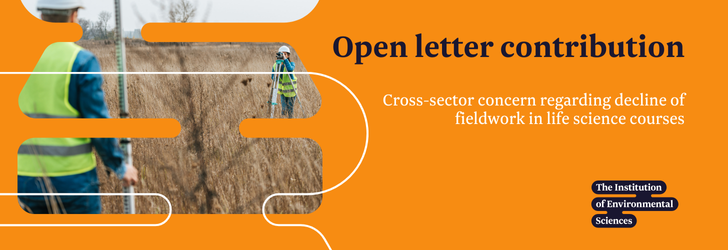The IES is a signatory to a letter convened by the Mammal Society to highlight to government and the public the worrying trend of fieldwork opportunities disappearing from life science programmes at UK universities. An open letter, signed by over 20 representatives of the conservation, ecology, education and museum sectors, was sent to ministers on Monday 12th May 2025.
Fieldwork provides opportunities for undergraduates to gain hands-on experience of applying ecology knowledge and skills in a real-world context, ensuring that they can solve real-world challenges and recognise species, signs of wildlife presence and habitat health indicators. Ecology consultancies have already reported to the Mammal Society a growing trend of career starters with life science degrees, who do not demonstrate sufficient field skills to be able to start working on projects without a period of shadowing experienced ecologists in the field.
The UK is considered severely nature-depleted based on data showing significant declines in species populations, habitat degradation, and the high number of species at risk of extinction. Since 1970, UK species have declined by about 19% on average (State of Nature 2023), and nearly 1 in 6 species are now threatened with extinction. Furthermore, only 14% of important habitats are considered to be in good condition. The government is committed to achieving a number of nature recovery targets set out in the Environment Act 2021 and Environmental Improvement Plan 2023, including the halting of species decline by 2030 and increasing species abundance by 10% by 2042, increasing tree canopy and woodland cover from 14.5% to 16.5% of total land area in England by 2050, restoring or creating more than 500,000 hectares of wildlife-rich habitat outside protected sites by 2042, restoring 75% of terrestrial and freshwater protected sites to favourable condition by 2042, and ensuring all sites of special scientific interest (SSSIs) have an up-to-date condition assessment. 50% of SSSIs are on track to achieve favourable condition by 31 January 2028. This represents a huge amount of work in the coming decades, for which a workforce of skilled ecologists will be essential.
Some institutions offer fieldwork opportunities to undergraduates but at an additional cost above course fees, or leave it up to students to find or create their own opportunities. This leads to an inequality of opportunity where students from more affluent backgrounds gain more skills valued by employers. A lack of inbuilt fieldwork can also make life science programmes less attractive and have less perceived value for students considering a career path in ecology, at a time when we need more skilled people entering the workforce to address the challenges of the biodiversity crisis.
The letter calls for the following:
- Recognition of field courses as essential training.
- Commitment to maintaining and expanding field opportunities.
- Financial support to ensure equitable access so that no student is excluded due to cost.
- Sustainable alternatives, such as UK-based fieldwork options, rather than eliminating courses in response to carbon footprint concerns.



